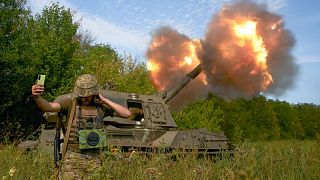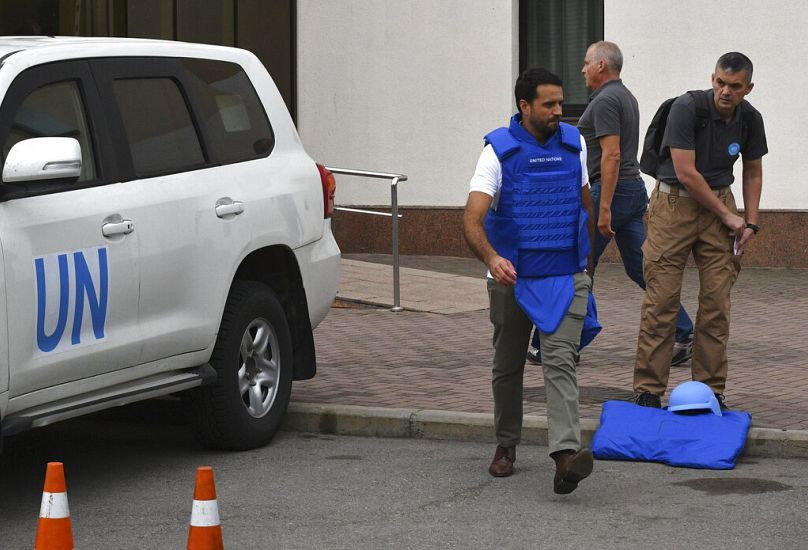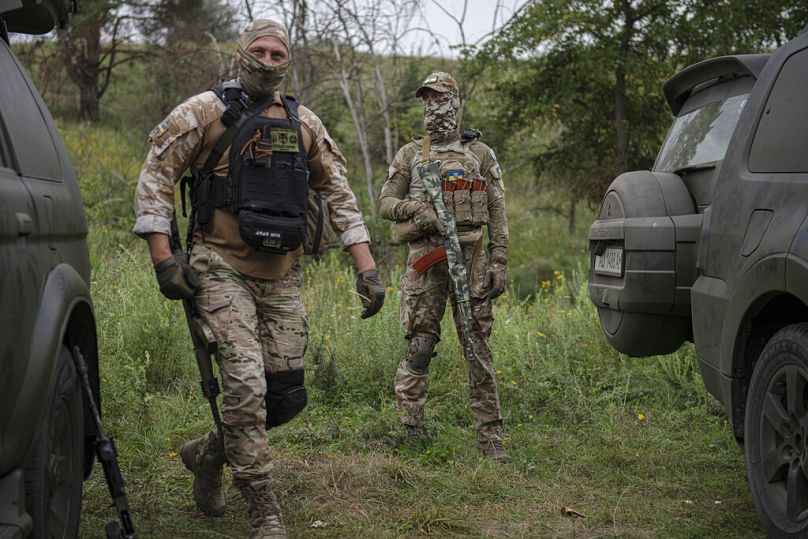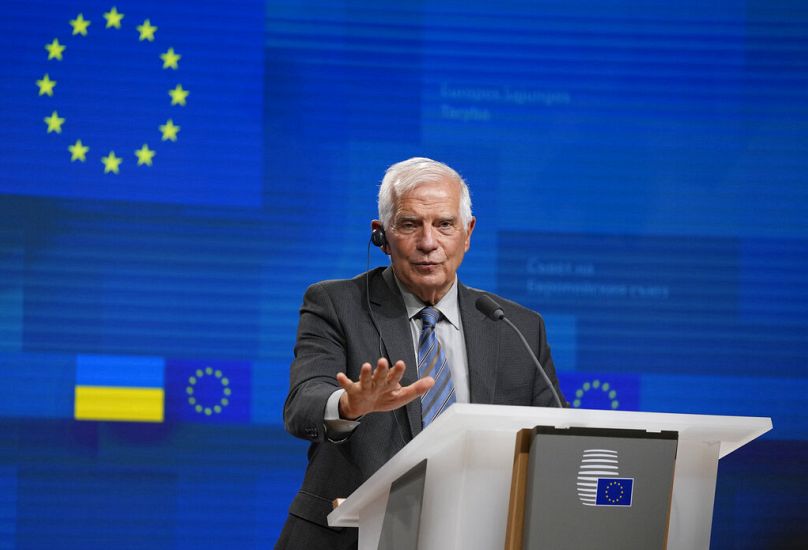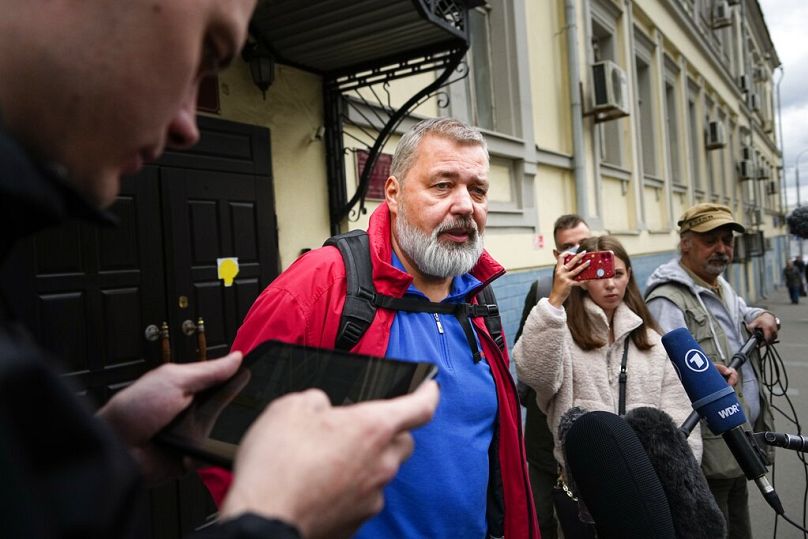Ukraine war: Kherson referendum suspended, IAEA to stay at nuclear plant, Europe low on weapons
1. Kherson referendum suspended over security concerns
Plans to hold a referendum to annex Ukraine’s Kherson region to Russia have been “paused” due to the ongoing security situation, Russian state-owned news agency TASS reported.
A Ukrainian soldier takes a selfie as an artillery system fires in the front line in Donetsk region, eastern Ukraine, Saturday, Sept. 3, 2022. – Copyright AP Photo / Kostiantyn Liberov
Kirill Stremousov, deputy head of the Russian-appointed military-civilian regional administration, added that the vital Antonivskyi road bridge, which crosses the Dnipro river near Kherson city, was impassable to cars following weeks of Ukrainian shelling.
Kherson city has been occupied by Russian troops and remains the only regional capital under their control since the beginning of the invasion.
Russian officials had called for referenda to be held this month in occupied regions, including the neighbouring Zaporizhzhia region and the self-proclaimed Donetsk and Luhansk People’s Republics, to coincide with local elections in Russia.
Last week, Ukraine stated that it had launched a counter-offensive aimed at retaking the region after shelling bridges and ammunition depots for weeks.
2. IAEA to stay at Zaporizhzhia nuclear plant on a ‘permanent basis’
Two of the six members of the International Atomic Energy Agency (IAEA) mission team are expected to stay at the Russian-occupied Zaporizhzhia nuclear plant on a “permanent basis”, said Ukraine’s state nuclear company, Energoatom.
The Ukrainian power plant was captured by Russia in March but continues to be operated by Energoatom’s engineers and supplies electricity to Ukraine’s grid.
Energoatom reported this decision on its Telegram channel, stating that “four of the six representatives of the IAEA inspection team completed their work at the Zaporizhzhia nuclear power plant and left the plant’s territory”.
This was also confirmed by a Russian-installed local official, Vladimir Rogov, in a radio interview on Monday, although he did not provide a specific time frame.
“The IAEA mission’s members have now left the Zaporizhzhia (plant), while at present two people have remained there as observers,” he said.
The UN watchdog mission arrived at the Zaporizhzhia last week, after heightened concerns that shelling at or near the plant could potentially result in a radiation leak. At present, Moscow and Kyiv are blaming each other for the attacks.
On Monday, a fire following “intensive shelling” at the plant resulted in it being knocked off of Ukraine’s electricity grid.
“We are going to be liaising and consulting with the staff at the facility. And I am going to consider the possibility of establishing a continued presence of the IAEA at the plant, which we believe is indispensable to stabilize the situation and to get regular, reliable, impartial, neutral updates of what the situation is there,” stated IAEA Director General, Rafael Grossi, last week. “It’s very important that the world knows what’s happening here.”
3. Zelenskyy reports Ukrainian gains in the south and east
President Volodymyr Zelenskyy announced on Sunday that the Ukrainian counter-offensive had made inroads after taking two settlements in the south, a third in the east, and additional territory in the eastern part of the country.
He did not identify the exact location of the territories and provided no timeline other than saying that he had received “good reports” at a meeting on Sunday from his military commanders and head of intelligence.
In his nightly video address, Zelenskyy thanked his forces for liberating a settlement in the eastern Donetsk region, the taking of “certain heights” also in an eastern area in the Lysychansk-Siversk direction and for liberating two southern settlements.
4. EU diplomat warns that weapon stocks are running low
Arms stocks in the European Union are running low as member countries continue to send weapons to Ukraine, the bloc’s foreign policy chief warned on Monday as he urged EU nations to better coordinate their spending on military materiel.
“The military stocks of most member states have been, I wouldn’t say exhausted, but depleted in a high proportion, because we have been providing a lot of capacity to the Ukrainians,” the EU’s top diplomat, Josep Borrell said in a debate with European lawmakers.
“It has to be refilled. The best way of refilling is doing that together. It will be cheaper,” he added.
At a meeting in the Czech Republic last week, EU defence ministers debated ways to better pool military materiel and resources, but also to bulk purchase ammunition and weapons like air defence systems that Ukraine continues to need.
Borrell warned on Monday that if member countries keep expanding their military capabilities in the same way, “the result will be a big waste of money because this is not a way of cancelling our duplications — there are a lot of them — or filling our gaps.”
The diplomat further expressed “regret” that EU member states did not begin training Ukrainian armed forces last year so that they could have been better equipped to handle Russia’s invasion.
Borrell’s statement comes at a time in which soaring energy prices – especially after the closure of gas supply route Nord Stream 1, for which the Kremlin blames Western sanctions – have caused Europe-wide support for arms assistance and sanctions to waver, especially in countries such as Germany and Italy.
5. Pro-democracy newspaper banned in Russia
Novaya Gazeta, one of Russia’s last independent news outlets, was banned from operating and stripped of its media licence on Monday.
Russian media watchdog, Rozkomnadzor, attributes this decision to a bureaucratic issue, namely the publication’s alleged failure to provide documents related to a change of ownership in 2006. Critics, nonetheless, have accused the ruling of being politically motivated.
Novaya Gazeta’s editor-in-chief himself – Nobel Peace laureate and outspoken critic of Vladmir Putin, Dmitry Muratov – described the verdict as a “political hit job, without the slightest legal basis”, and stated that the paper would appeal.
The United Nations Human Rights office further described the ruling as “yet another blow to the independence of Russian media”, and urged Moscow to protect press freedom.
Since Novaya Gazeta’s foundation in 1993, the pro-democracy outlet has shed light on several social and political issues in Russia, including government corruption and human rights abuses, such as Chechnya’s anti-gay purges.
The paper had already suspended all activities on 28 March, as critics of Russia’s invasion of Ukraine face severe penalties. Muratov himself was attacked for his political positions back in April, after a man doused him with red paint.
